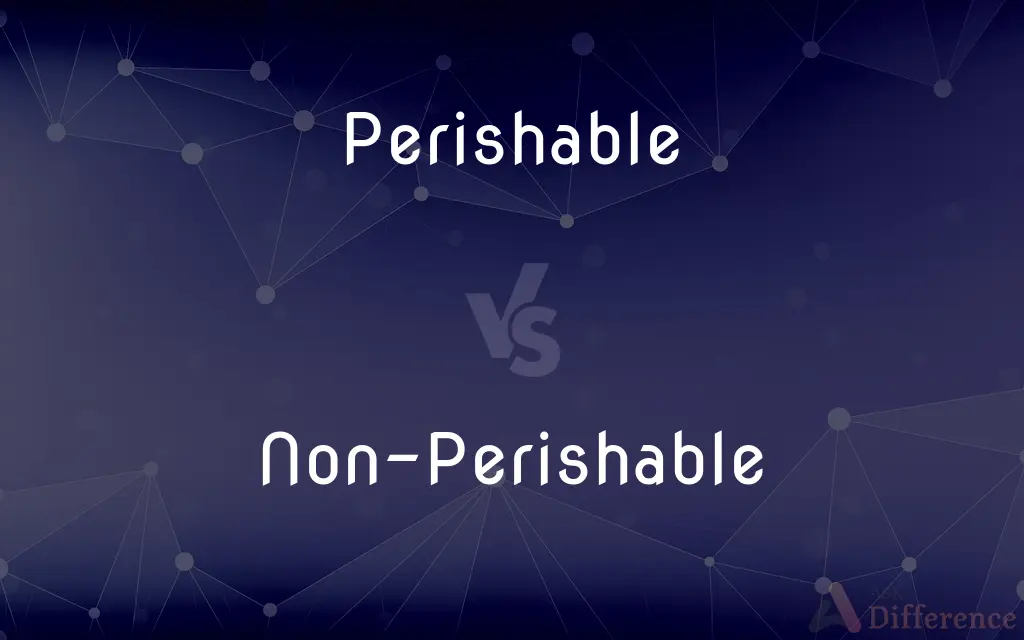Perishable vs. Non-Perishable — What's the Difference?
By Tayyaba Rehman — Published on September 27, 2023
Perishable items are goods that have a limited lifespan and degrade quickly, requiring specific storage conditions like refrigeration. Non-perishable items have a longer shelf life and do not require special storage conditions, making them long-lasting.

Difference Between Perishable and Non-Perishable
Table of Contents
ADVERTISEMENT
Key Differences
Perishable items are those that have a limited shelf life and can spoil or deteriorate quickly if not stored under certain conditions. These items often require refrigeration, temperature control, or other specific environmental conditions. Non-perishable items, on the other hand, have a longer shelf life and are less sensitive to environmental conditions, making them ideal for long-term storage.
Both perishable and non-perishable items come in a variety of forms, such as food, medicine, and even some consumer goods. Perishable items include items like fresh fruits, vegetables, meats, and dairy products. Non-perishable items include canned goods, dried foods, and cleaning supplies, which do not need specific temperature control or special storage.
Grammatically, "perishable" and "non-perishable" are both adjectives. While "perishable" is a standalone word, "non-perishable" uses the prefix "non-" to negate the meaning of "perishable," signaling its opposite nature. Both words can be used as nouns when referring to items or goods that possess their respective characteristics.
Perishable items generally require more care in handling, transportation, and storage due to their nature. They are more susceptible to factors like temperature, moisture, and time. Non-perishable items are more forgiving and versatile, as they can be stored almost anywhere without worrying about quick deterioration.
The terms "perishable" and "non-perishable" are often used in the context of emergency planning and supplies. Perishable items are generally not recommended for emergency kits due to their limited lifespan and storage requirements. Non-perishable items are preferred for such situations because of their long shelf life and low-maintenance storage needs.
ADVERTISEMENT
Comparison Chart
Shelf Life
Limited, short
Longer, durable
Storage Requirements
Requires specific conditions like refrigeration
No special storage conditions
Types of Goods
Fresh food, certain medicines
Canned goods, dried foods, cleaning supplies
Grammatical Structure
Standalone adjective
Adjective with "non-" prefix
Use in Emergencies
Generally not recommended
Preferred due to long shelf life
Compare with Definitions
Perishable
Sensitive to environmental conditions.
Perishable items like fresh produce should not be left in a hot car.
Non-Perishable
Suitable for long-term storage.
Non-perishable items are ideal for emergency preparedness.
Perishable
Limited shelf life.
Milk is perishable and needs to be refrigerated.
Non-Perishable
Long shelf life.
Canned beans are a non-perishable food item.
Perishable
Prone to spoilage.
Meat is a perishable item that can spoil quickly.
Non-Perishable
Resistant to spoilage.
Dried fruits are a non-perishable snack option.
Perishable
Requires special storage.
Perishable medicines need to be kept in a temperature-controlled environment.
Non-Perishable
Requires no special storage.
Non-perishable items like rice can be stored in a pantry.
Perishable
Subject to decay, spoilage, or destruction.
Non-Perishable
Not sensitive to environmental conditions.
Cleaning supplies are generally non-perishable.
Perishable
Liable to perish, especially naturally subject to quick decomposition or decay.
Perishable
That which perishes or is short-lived.
Perishable
(in the plural) food that does not keep for long.
Perishable
Liable to perish; subject to decay, destruction, or death; as, perishable goods; our perishable bodies.
Perishable
Liable to perish; subject to destruction or death or decay;
This minute and perishable planet
Perishable foods such as butter and fruit
Perishable
Not suitable for long-term storage.
Perishable foods are not ideal for emergency kits.
Common Curiosities
Can Perishable items be frozen to extend shelf life?
Yes, many perishable items like meats can be frozen to extend their shelf life.
What does Perishable mean?
Perishable refers to items with a limited shelf life that can spoil or deteriorate quickly.
Are canned goods Non-Perishable?
Yes, canned goods are generally considered non-perishable due to their long shelf life.
What types of foods are Perishable?
Fresh fruits, vegetables, dairy, and meats are examples of perishable foods.
What types of foods are Non-Perishable?
Canned goods, dried foods, and grains are examples of non-perishable foods.
Do Non-Perishable items ever expire?
While they have a long shelf life, non-perishable items can still expire but usually after a very long period.
Are Non-Perishable items suitable for emergency kits?
Yes, non-perishable items are ideal for emergency kits due to their long shelf life.
What does Non-Perishable mean?
Non-perishable refers to items with a long shelf life that do not require special storage conditions.
Is the word "Non-Perishable" a noun or an adjective?
"Non-perishable" can also function as both a noun and an adjective.
How do Perishable and Non-Perishable items differ?
Perishable items have a limited shelf life and require special storage, while non-perishable items are long-lasting and require no special storage.
Are Perishable items suitable for emergency kits?
Perishable items are generally not suitable for emergency kits due to their limited shelf life.
Can Non-Perishable items be transported easily?
Non-perishable items are easier to transport as they do not require special storage conditions.
Do Perishable items require refrigeration?
Most perishable items require refrigeration or other special storage conditions.
Can Perishable items be transported easily?
Perishable items usually require special conditions for transportation, making them less easy to transport.
Is the word "Perishable" a noun or an adjective?
"Perishable" can function as both a noun and an adjective.
Share Your Discovery

Previous Comparison
Timeline vs. Timeframe
Next Comparison
Laziness vs. ProcrastinationAuthor Spotlight
Written by
Tayyaba RehmanTayyaba Rehman is a distinguished writer, currently serving as a primary contributor to askdifference.com. As a researcher in semantics and etymology, Tayyaba's passion for the complexity of languages and their distinctions has found a perfect home on the platform. Tayyaba delves into the intricacies of language, distinguishing between commonly confused words and phrases, thereby providing clarity for readers worldwide.












































